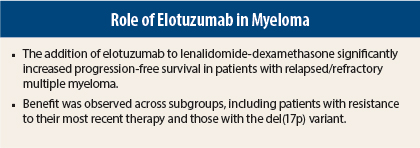In an interim analysis of the phase III ELOQUENT-2 trial reported in The New England Journal of Medicine, Sagar Lonial, MD, of Emory University School of Medicine, Meletios Dimopoulos, MD, of National and Kapodistrian University of Athens, and colleagues found that the addition of elotuzumab to lenalidomide (Revlimid)/dexamethasone significantly increased progression-free survival in patients with relapsed or refractory multiple myeloma.1
Elotuzumab is an immunostimulatory monoclonal antibody targeting signaling lymphocytic activation molecule F7 (also known as SLAM7, SLAMF7, and CS1). Bone marrow myeloma cells (approximately 95%) express SLAM7, as do natural killer cells. Elotuzumab directly activates natural killer cells and mediates antibody-dependent cell-mediated cytotoxicity via the CD16 pathway.
Study Details
In this open-label trial conducted at 168 sites worldwide, 648 patients were randomly assigned between June 2011 and November 2012 to receive elotuzumab plus lenalidomide/dexamethasone (n = 321) or lenalidomide/dexamethasone alone (n = 325). Elotuzumab was given intravenously at 10 mg/kg on days 1, 8, 15, and 22 during 28-day cycles, along with lenalidomide at 25 mg/d on days 1 to 21 and dexamethasone orally at 40 mg during the week without elotuzumab and intravenously at 8 mg plus 28 mg orally on the day of elotuzumab administration. Patients in the control group received lenalidomide at 25 mg on days 1 to 21 and oral dexamethasone at 40 mg on days 1, 8, 15, and 22.
The coprimary endpoints were progression-free survival and objective response rate. The primary analysis of progression-free survival used independent review committee assessment of tumor response and censoring of data for patients who received subsequent myeloma therapy or missed assessments. Intention-to-treat analysis was performed as a supportive evaluation.
The elotuzumab and control groups were generally balanced for age (median, 67 and 66 years), sex (60% and 59% male), Eastern Cooperative Oncology Group performance status (0 for 50% and 45%, 1 for 43% and 45%, 2 for 8% and 11%), race/ethnicity (82% and 86% white, 10% Asian in both), presence of del(17p) (32% in both), presence of t(4:14) (9% and 10%), and stage (I in 44% and 42%, II in 32% in both, III in 21% in both).
The study groups were also balanced for number of previous treatments (median of 2 in both, ≥ 3 in 16% in both), previous stem cell transplantation (52% and 57%), and previous therapies (bortezomib [Velcade] in 68% and 71%, melphalan in 69% and 61%, thalidomide [Thalomid] in 48% in both, lenalidomide in 5% and 6%). Response to the most recent line of therapy was refractory for 35% in both groups, including 22% and 21% refractory to bortezomib and 9% and 11% refractory to thalidomide, and relapse in 65% in both.
Progression-Free Survival
After a median follow-up of 24.5 months, median progression-free survival in the primary analysis was 19.4 months (95% confidence interval [CI] = 16.6–22.2 months) in the elotuzumab group vs 14.9 months (95% CI = 12.1–17.2 months) in the control group (hazard ratio [HR] = 0.70, P < .001). The outcome was similar in the intention-to-treat analysis (HR = 0.68, 95% CI = 0.56–0.83). Rates of progression-free survival were 68% vs 57% at 1 year and 41% vs 27% at 2 years in the elotuzumab and control groups, respectively.
The benefit of elotuzumab was consistent across subgroups, including patients aged 65 years and older and those with resistance to the most recent line of therapy, stage III disease, previous exposure to bortezomib or immunomodulatory drugs, previous stem cell transplantation, and those with the del(17p) variant. Multivariate analysis suggested an increased benefit of elotuzumab among patients diagnosed at least 3.5 years before study entry (median, 26.0 vs 17.3 months, HR = 0.55, P < .001).
Overall response rates were 79% vs 66% (odds ratio = 1.9, P < .001), with a complete response in 4% vs 7%. At the time of progression-free survival analysis, when 49% of prespecified deaths for final overall survival analysis had occurred, 30% of the elotuzumab group and 37% of the control group had died.
Adverse Events
The most common grade 3 or 4 hematologic adverse events in the elotuzumab group were lymphocytopenia (77% vs 49% in control group), neutropenia (34% vs 44%), anemia (19% vs 21%), and thrombocytopenia (19% vs 20%). The most common grade 3 or 4 nonhematologic adverse events were fatigue (8% vs 8%) and diarrhea (5% vs 4%). Grade 3 or 4 cardiac disorders occurred in 4% and 6%, and grade 3 or 4 renal disorders occurred in 4% in both groups. Serious adverse events were reported in 65% and 57% of patients.
Infections were reported in 81% vs 74% of patients, with infection rates being identical in the two groups after adjustment for drug exposure (197 events per 100 patient-years). Infusion reactions were reported in 33 elotuzumab patients (10%, grade 1 or 2 in 29 and grade 3 in 4), with 70% of reactions occurring during the first dose. Infusion was interrupted in 5% of patients. Reactions resolved in all patients except 2 (1%), with both discontinuing treatment.
The investigators concluded: “Patients with relapsed or refractory multiple myeloma who received a combination of elotuzumab, lenalidomide, and dexamethasone had a significant relative reduction of 30% in the risk of disease progression or death.” ■
Disclosure: The study was funded by Bristol-Myers Squibb and AbbVie Biotherapeutics. For full disclosures of the study authors, visit www.nejm.org.
Reference
1. Lonial S, Dimopoulos M, Palumbo A, et al: Elotuzumab therapy for relapsed or refractory multiple myeloma. N Engl J Med 373:621-631, 2015.




